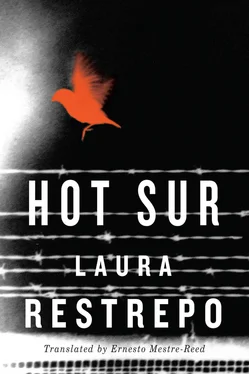“Don’t tangle yourself up in too many theories, Mr. Rose,” Ming said when Rose paid a visit to the editor’s apartment in Chelsea for the second time since Cleve’s death, this time to give the editor an idea of the anguished and somewhat confusing framework of his speculations. “This is a simple but revolting story, with a clear-cut murderer named Sleepy Joe. Cleve and I agreed on this point.”
“You talked with him about this?” Rose asked.
“Yes, I did indeed. He had Sleepy Joe in his sights.”
“Alright,” Rose said, “Sleepy Joe. But who are his accomplices?”
“If I may suggest something, it’s better to assume that others are innocent until proven otherwise. Proceed slowly; don’t let yourself become overwhelmed by the whole unmanageable package. The first thing you have to do is find María Paz. Do you want me to help you, Mr. Rose? I could arrange things here, find someone to feed my bettas, and…”
“No, Ming, this is something I need to take care of on my own. Thank you, it’s good to know I can count on you.”
“Promise me you’ll get in touch if things get ugly.”
“I think I’m going to need a gun. I don’t plan on killing anyone,” Rose said, more or less lying. “It’s just a precaution.”
“I have a few. But they are basically collector’s items,” Ming said, as he pulled out a small pistol from a cabinet, giving to Rose and identifying it as a Remington Model 95.
“It looks like a toy,” Rose said, making sure it fit in his pocket. “Does it work?”
“I doubt it,” Ming responded, pointing to the name engraved on the barrel, Claro Hurtado, one of Pancho Villa’s bodyguards. “It clearly didn’t work so well for Claro that July 23, 1923, when they gunned him down in Parral, Chihuahua, along with his big boss. I also have this,” he said, pulling out a katana that according to him was the Hattori Hanzo sword used by Beatrix Kiddo in Kill Bill .
“Is it real or a prop?” Rose asked.
“The edge has been shaved down, and it was manufactured to be ultralight so that Uma Thurman could wield it.”
“It feels like it’s made of fiberglass.”
“No more useful than a rat’s tail,” Ming said, as he placed other collector’s items on the table.
Rose noticed a solid, black piece, free of ornamentations or other frills, which inspired some confidence in him.
“And whose was this?” he asked.
“It doesn’t have much of a history, or it does, but a personal one, because I inherited it from my father, and my father in turn from his father, and so on into the mists of time. It’s a Glock 17 9 mm. A solid and serious gadget. With a hard trigger, but on the other hand you can load seventeen cartridges into it, and it fires quickly. I have ammunition for this one, half a box, and I can show you how to load it.”
Rose stored the Glock and the box of ammunition in the glove compartment of his Ford Fiesta and returned to his home in the mountains resolved to put Empera through an Inquisition-style round of questioning. He sat her in front of him and bombarded her with questions. As expected, Empera proved a tough nut to crack, and the more he pressed her, the dodgier she became. She had no idea what he was talking about and rolled her eyes every time he mentioned María Paz, responding in a haughty tone that she didn’t know anything about anything, and that, moreover, it was none of her business. Rose couldn’t get her to shift from that position, although he swore on his son’s grave that he was not trying to harm María Paz or turn her in to the authorities. On the contrary, in fact. It was only when he explained in detail to Empera the situation with the clamp in María Paz’s uterus that she seemed to soften and said she would do what she could.
“But I’m not promising anything,” she warned him, “and by the way, I should remind you that it has been sixteen months since my last raise.”
“We’ll fix that. Don’t worry about the raise. But can I count on you?”
“No guarantees, but I’ll see what I can do.”
Rose tells me that it became imperative to find María Paz, because of the clamp, sure, but above all because he was sure that sooner or later she would lead him to Sleepy Joe. And because something very strange and powerful began to grow inside him, something that was not so much the pain from the loss anymore, but instead, in a weird way, a substitute for the pain, a kind of consolation, perhaps the only one possible.
“I don’t know if I’ve told you that I’ve never been attracted to the idea of vengeance,” he says. “It has always seemed a distractive fallacy to me, one of the most pervasive misconceptions, a hateful and absurd national sport. Thousands of movies and television shows, heaps of novels, weapons sales and propaganda, a whole multibillion-dollar industry that feeds off the lust for vengeance that haunts Americans. But not me. It had never interested me before. Nevertheless, something inside me began to savor it the moment I put a face to the thug who had killed and tortured my son. It was then that I began to dream of making him pay for all his actions, one by one. I wanted to see him turned into a pile of shit, to kill him with my own two hands, watch him bleed and scream in agony, and beg forgiveness. I wanted to spit on him, shit on him, waste him.”
Night and day, it was always there: a shifting mass of lava that sketched and erased the incandescent image of his son, Cleve. Cleve bristling with thorns, like the Nazarene or like a porcupine. Cleve, the target in some macabre plot. Cleve, the sacrificial scapegoat in some disgusting ritual. His murderer had to be somewhere, this lunatic possessed by a terrible sense of the liturgy, this asshole with a mania for sacrifice that was one of the many manifestations of his mental illness. Wherever he was hiding, Rose would find him.
“You have to understand,” he tells me, “this is about one of those changes that strikes you as if a blow to the head. Cleve’s death had become a nameless torment that was eating me alive, a permanent guilt with no logic. But all of a sudden, it had a name, one name, and one name only: Sleepy Joe. Finally, there was something besides me to blame, someone aside from myself on which to take out the rage.
“Bringing Cleve back was not possible, but I could blow the fuck out of that Sleepy Joe. One thing followed the other. It was something as irrational as a physiological need, as pressing as eating or sleeping. At that moment I didn’t see it as such, but today I realize that past a certain point, no one would have stopped me from doing what I set out to do even if they had given me incontrovertible proof that Sleepy Joe had nothing to do with Cleve’s death. Do you understand? These facts would have been irrelevant to me. When the mechanism of revenge is triggered, nothing can stop it. Vengeance doesn’t have to be sure about what it does; it just needs a target, any target it can properly aim at. You’ve received a mortal blow, and to remain alive you need to deliver a similar blow. You’ve chosen your bull’s-eye and you go after it. Vengeance is not reflective or flexible; it’s implacable and blind. It has nothing to do with justice. Whoever believes that he is enforcing justice through vengeance is just lying to himself. It is about something much more primal, more bestial. You’ve become an enraged bull, and they’ve just waved a red cloth in front of you. In Colombia, there was a saying that once caught my attention: ‘kill and eat the dead.’ ‘He could kill and eat the dead,’ that’s how they described someone in a rage, just a popular saying, a hyperbole like any other. And at the same time, maybe not. That phrase gave me the chills because it seemed to contain some ancient wisdom from ancestral times in which cannibalistic vengeance was the supreme form of vengeance. I didn’t even remember the saying or think about it until I discovered someone had murdered Cleve in such a horrendous manner. From the moment I identified the perpetrator, that saying began to resonate in my memory: to kill and eat the dead, to kill and eat the dead.”
Читать дальше












